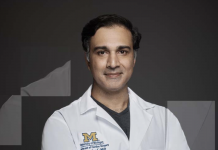What cancer patients want, besides a cure, is hope for a cure. Clinical trials ÔÇö the process by which doctors and scientists test new and experimental treatments ÔÇö search for new ways to combat disease, giving patients who have exhausted other treatments a crucial plan B. Here is a look at two Detroit-area doctors specializing in womenÔÇÖs health who are doing vital work in the field of hope.
Ovarian Cancer: Rethinking the Platinum Standard
Dr. Ira Winer, a gynecologic oncologist at the , is the principal investigator for multiple studies on cancers of the female reproductive system. For ovarian cancer, Winer is researching how to fight forms that are resistant to traditional chemotherapy.
Platinum-based chemo is standard for ovarian cancer, but up to 30 percent of ovarian cancer patients have resistance to this treatment. ÔÇ£Once [the cancer] has developed that resistance,ÔÇØ Winer says, ÔÇ£the patients donÔÇÖt do as well.ÔÇØ
Winer is leading multiple clinical trials that give ovarian cancer patients with platinum chemo resistance another option. One study combines different immunotherapies that boost a patientÔÇÖs immune system response.
Researchers make minute adjustments to treatments based on how the participant responds, combining╠²an immunotherapy drug that already works╠²with an experimental drug. The results have╠²been so promising that the Food and Drug Administration granted a ÔÇ£fast trackÔÇØ designation to the treatment, expediting the approval process for mainstream use.
Breast Cancer: Tailor-Made Treatments
Dr. Joshua Dilworth, a radiation oncologist affiliated with in Royal Oak, is the principal investigator on the , the second most common cancer in women after skin cancer.
The Phase 3 trial (the stage where a new treatment is tested against standard treatments) is being conducted at medical institutions across the U.S. and Canada, with the hope of producing more effective treatments for women with ER- positive and HER2-negative breast cancer.
The trial has two goals. The first is to╠²use tumor biology to guide treatment recommendations. In the past, tumor size and the number of cancer-affected lymph nodes determined whether or not radiation therapy to the chest area would be beneficial. But since all tumors are different, this trial tailors treatments based on a personÔÇÖs individual genes.
Cancer treatment is never one-size-fits-all, Dilworth says. You can have two patients, each with the same sized tumor and the same number of affected lymph nodes,  but each with very different risks of a cancer recurrence.
The other goal of the study addresses how╠²to avoid overtreating patients; reducing the intensity or duration of treatment (or even eliminating certain treatments entirely) to minimize side effects is known medically as ÔÇ£de-escalation.ÔÇØ
Radiation therapy targets and kills cancer cells, reducing the likelihood of a recurrence, but it has serious side effects. Yet radiation therapy might not make a significant difference for patients who have a biologically low-risk disease. If the patients in the trial who donÔÇÖt receive radiation end up just as healthy as those who do, it doesnÔÇÖt make sense for others in the same boat to continue with radiation therapy.
ÔÇ£We need to balance the risk of side effects with the benefit of the treatment,ÔÇØ Dilworth says. Decreasing the amount of treatment ÔÇö and therefore those side effects ÔÇö can improve a patientÔÇÖs quality of life.
Doctors, hospitals, and medical schools╠²are always recruiting subjects for clinical╠²trials. Oncologists will often recommend a╠²trial to eligible patients. Find a list of trials╠²at .╠²For the two institutions mentioned, visit their clinical trial search pages: and .
This story is from the October 2023╠²issue of ║┌┴¤═° Detroit magazine. Read more in our digital edition.
|
| ╠² |
|








